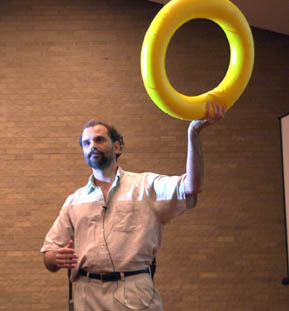The Ivan and Betty Niven Distinguished Lectures
University of British Columbia
March 5 - 6, 2007
The UBC Department of Mathematics is proud to present a series of lectures on Number Theory presented by Fernando Rodríguez-Villegas of the University of Texas at Austin.

These lecture series were made possible through a generous bequest received from Ivan and Betty Niven.
In honor of their generous support, the Department of Mathematics has established a permanent endowment fund, "The Ivan and Betty Niven Distinguished Lectures Fund", the income from which will fund a series of annual lectures on a broad array of topics in Mathematics.
Lecture #1 (Mathematics Colloquium)
Monday, March 5, 4:00-5:00, MATX 1100
Combinatorics as geometry
I will discuss the main ingredients of the calculation, which involves an array of techniques from combinatorics and representation theory of finite groups of Lie type. The outcome of the calculation has several geometric consequences about the varieties; for example, it allows us to compute their topological Euler characteristic. But more importantly they naturally suggest interesting conjectures about their mixed Hodge polynomials.
Besides their intrinsic interest the varieties in question are closely related to the moduli spaces of Higgs bundles on the surface. Somewhat surprisingly we discover a tight connection between the geometry of these character varieties and the Macdonald polynomials of combinatorics.
This is joint work with T. Hausel and E. Letellier
Tea, 3:45, MATX 1115
Lecture #2 (Student Lecture)
Tuesday, March 6, 3:30-4:30, MATH 203
Puzzles and groups
Refreshments, 4:30, MATX 1115
Contact info: Matilde Lalin. E-mail: mlalin AT math DOT ubc DOT ca. Phone: (604) 822-8746.
Flyer, Student lecture flyer, and Poster